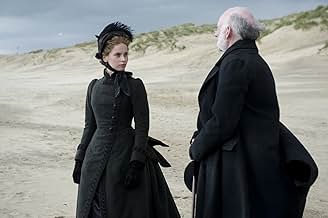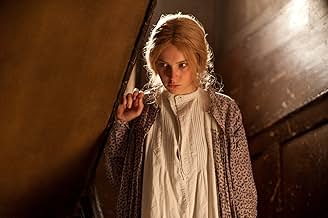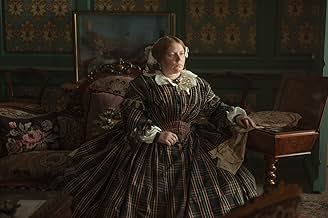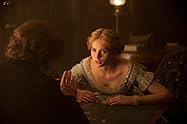AVALIAÇÃO DA IMDb
6,1/10
11 mil
SUA AVALIAÇÃO
No auge de sua carreira, Charles Dickens conhece uma mulher mais jovem que se torna sua amante secreta até sua morte.No auge de sua carreira, Charles Dickens conhece uma mulher mais jovem que se torna sua amante secreta até sua morte.No auge de sua carreira, Charles Dickens conhece uma mulher mais jovem que se torna sua amante secreta até sua morte.
- Indicado a 1 Oscar
- 1 vitória e 7 indicações no total
Ralph Fiennes
- Charles Dickens
- (as Mr. Ralph Fiennes)
Felicity Jones
- Nelly
- (as Ms. Felicity Jones)
Kristin Scott Thomas
- Mrs. Frances Ternan
- (as Ms. Kirstin Scott Thomas)
Tom Hollander
- Wilkie Collins
- (as Mr. Tom Hollander)
John Kavanagh
- Rev. William Benham
- (as Mr. John Kavanagh)
Tom Attwood
- Mr. Lambourne
- (as Mr. Tom Atwood)
Susanna Hislop
- Mary
- (as Ms. Susanna Hislop)
Tom Burke
- Mr. George Wharton Robinson
- (as Mr. Tom Burke)
Tommy Curson-Smith
- Geoffrey
- (as Mr. Tommy Curson-Smith)
David Collings
- Governor
- (as Mr. David Collings)
Michael Marcus
- Charley Dickens
- (as Mr. Michael Marcus)
Perdita Weeks
- Maria Ternan
- (as Ms. Perdita Weeks)
Richard McCabe
- Mr. Mark Lemon
- (as Mr. Richard McCabe)
Gabriel Vick
- Mr. Berger
- (as Mr. Gabriel Vick)
Mark Dexter
- Mr. Augustus Egg
- (as Mr. Mark Dexter)
Joseph Paxton
- Mr. Pigott
- (as Mr. Joseph Paxton)
Sophie Russell
- Miss Ellen Sabine
- (as Ms. Sophie Russell)
Christos Lawton
- Mr. Evans
- (as Mr. Christos Lawton)
- Direção
- Roteiristas
- Elenco e equipe completos
- Produção, bilheteria e muito mais no IMDbPro
Enredo
Você sabia?
- CuriosidadesRalph Fiennes and Felicity Jones appeared in Caindo no Mundo (2010), in which they played father and daughter. In a 2013 interview with Jones and Fiennes on National Public Radio, Jones said that it was "weird" and "very Freudian" to go from playing one relationship to the other, but Fiennes disagreed, saying "It's just a job. Come on."
- Erros de gravaçãoWhen collecting cash for the hospital, there is an 1895 Crown coin on the plate. Charles Dickens died in 1870.
- Citações
Charles Dickens: A wonderful fact to reflect upon, that every human creature is a profound secret and mystery to every other.
Nelly: Until that secret is given to another to look after. And then perhaps two human creatures may know each other.
- Cenas durante ou pós-créditosThe full cast list (in order of appearance) is presented in the style of a Dickens era theatre programme, with contemporary font and the performers' names preceded by "Mr." or "Ms."
- ConexõesFeatured in Film '72: Episode dated 30 January 2014 (2014)
- Trilhas sonorasSir Roger de Coverly
(uncredited)
Traditional
[Dickens dances with Nelly]
Avaliação em destaque
Claire Tomalin in the first chapter of 'The Invisible Woman' states that Fanny and Ellen Ternan were 'written out of any biographies of both Dickens and Trollope for two reasons'. Thus begins the first of many such statements that appear in her book that can't be substantiated. They are not facts, though they are presented as such. Any film based on the book by Claire Tomalin can only suffer, as a result, from the contrived nature and bias of the book.
Yes, this film might have deserved 8 out of 10 stars if Charles Dickens hadn't come into it and it was simply the story of a writer who had an affair with a much younger woman in Victorian times. Unfortunately, Charles Dickens does come into it, and he has come into it in every review and discussion about this film that I've come across so far.
The first half of Ralph Fiennes' film is beautifully nuanced and utterly delightful in its depiction of Dickens and his relationship with the Ternan family through their mutual love of the theatre. The developing relationship between Dickens and Ellen Ternan is persuasive in cinematic terms - until the downward slide into the mire of 'revelations' spawned by Claire Tomalin's book.
Stripped of meaningful content, cinematography and acting too become meaningless. When a film is based on the life of a great writer like Charles Dickens, those who have read widely about his life and work will feel uneasy when he is taken out of context to fulfil a role aggressively forced on him by a less than scrupulous biographer or film maker. The so-called 'revelations' translated to film may spoil one's enjoyment of the narrative as surely as a poor reproduction of a film to a DVD will lessen its visual impact.
Those who have a scant knowledge of Dickens and his work will more easily be able to accept this depiction of the writer and the man. Sadly, like many of the reviewers and others connected with the film, they may then become 'authorities' on Charles Dickens and his relationship with Ellen Ternan and busily go about perpetuating myths and gross distortions of facts.
By the time furtive sex is followed by the birth of a still-born child and Dickens and Ellen appear unchaperoned in the Staplehurst train crash, the sound of Nelly's pacing on the beach at Margate becomes deafening - but also more laboured. We enter a world of fiction that is not nearly so satisfying. The more the film strays from known sources and tries to convince, the more it flounders and disappoints.
One can only hope someone makes another film about Charles Dickens that does justice to everyone in a way that saves them from the strange mix of sexual fantasy and strident feminism they appear to have generated. While Nelly suffers from not having the reasons for the secrecy surrounding her relationship fully explored, Catherine Dickens and George Wharton Robinson suffer in a way that endows them with as much character as a couple of wooden pieces in a jig-saw puzzle.
'It would be a far, far better thing' to stay home and read Dickens' letters or other biographies or more of Dickens' own writing or Edward Wagenknecht's 'Dickens and the Scandalmongers' or more about the social and sexual mores of the time than to believe this film could possibly shed any light on the less stereotypical but more complex relationship between Charles Dickens and Ellen Ternan.
Yes, this film might have deserved 8 out of 10 stars if Charles Dickens hadn't come into it and it was simply the story of a writer who had an affair with a much younger woman in Victorian times. Unfortunately, Charles Dickens does come into it, and he has come into it in every review and discussion about this film that I've come across so far.
The first half of Ralph Fiennes' film is beautifully nuanced and utterly delightful in its depiction of Dickens and his relationship with the Ternan family through their mutual love of the theatre. The developing relationship between Dickens and Ellen Ternan is persuasive in cinematic terms - until the downward slide into the mire of 'revelations' spawned by Claire Tomalin's book.
Stripped of meaningful content, cinematography and acting too become meaningless. When a film is based on the life of a great writer like Charles Dickens, those who have read widely about his life and work will feel uneasy when he is taken out of context to fulfil a role aggressively forced on him by a less than scrupulous biographer or film maker. The so-called 'revelations' translated to film may spoil one's enjoyment of the narrative as surely as a poor reproduction of a film to a DVD will lessen its visual impact.
Those who have a scant knowledge of Dickens and his work will more easily be able to accept this depiction of the writer and the man. Sadly, like many of the reviewers and others connected with the film, they may then become 'authorities' on Charles Dickens and his relationship with Ellen Ternan and busily go about perpetuating myths and gross distortions of facts.
By the time furtive sex is followed by the birth of a still-born child and Dickens and Ellen appear unchaperoned in the Staplehurst train crash, the sound of Nelly's pacing on the beach at Margate becomes deafening - but also more laboured. We enter a world of fiction that is not nearly so satisfying. The more the film strays from known sources and tries to convince, the more it flounders and disappoints.
One can only hope someone makes another film about Charles Dickens that does justice to everyone in a way that saves them from the strange mix of sexual fantasy and strident feminism they appear to have generated. While Nelly suffers from not having the reasons for the secrecy surrounding her relationship fully explored, Catherine Dickens and George Wharton Robinson suffer in a way that endows them with as much character as a couple of wooden pieces in a jig-saw puzzle.
'It would be a far, far better thing' to stay home and read Dickens' letters or other biographies or more of Dickens' own writing or Edward Wagenknecht's 'Dickens and the Scandalmongers' or more about the social and sexual mores of the time than to believe this film could possibly shed any light on the less stereotypical but more complex relationship between Charles Dickens and Ellen Ternan.
- pwiltsh
- 16 de abr. de 2014
- Link permanente
Principais escolhas
Faça login para avaliar e ver a lista de recomendações personalizadas
- How long is The Invisible Woman?Fornecido pela Alexa
Detalhes
- Data de lançamento
- Países de origem
- Central de atendimento oficial
- Idiomas
- Também conhecido como
- The Invisible Woman
- Locações de filme
- Empresas de produção
- Consulte mais créditos da empresa na IMDbPro
Bilheteria
- Faturamento bruto nos EUA e Canadá
- US$ 1.234.254
- Fim de semana de estreia nos EUA e Canadá
- US$ 31.948
- 29 de dez. de 2013
- Faturamento bruto mundial
- US$ 3.986.888
- Tempo de duração1 hora 51 minutos
- Cor
- Mixagem de som
- Proporção
- 2.35 : 1
Contribua para esta página
Sugerir uma alteração ou adicionar conteúdo ausente

Principal brecha
By what name was O Nosso Segredo (2013) officially released in India in Hindi?
Responda

























